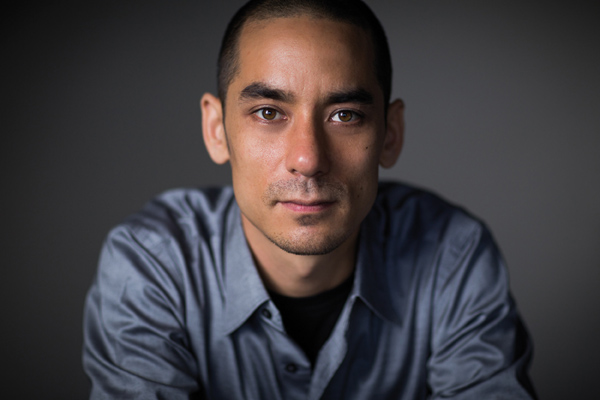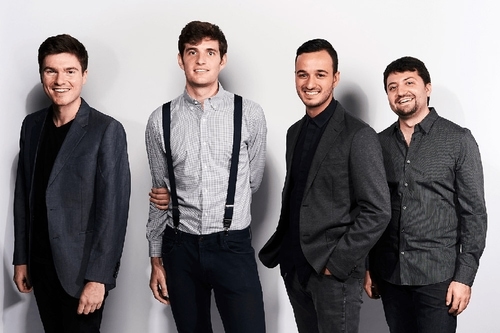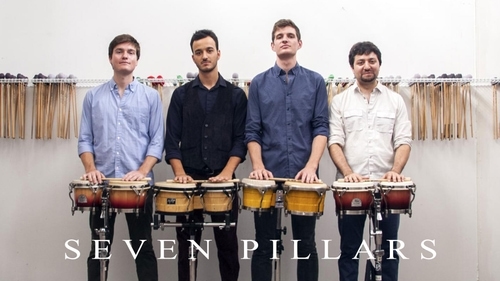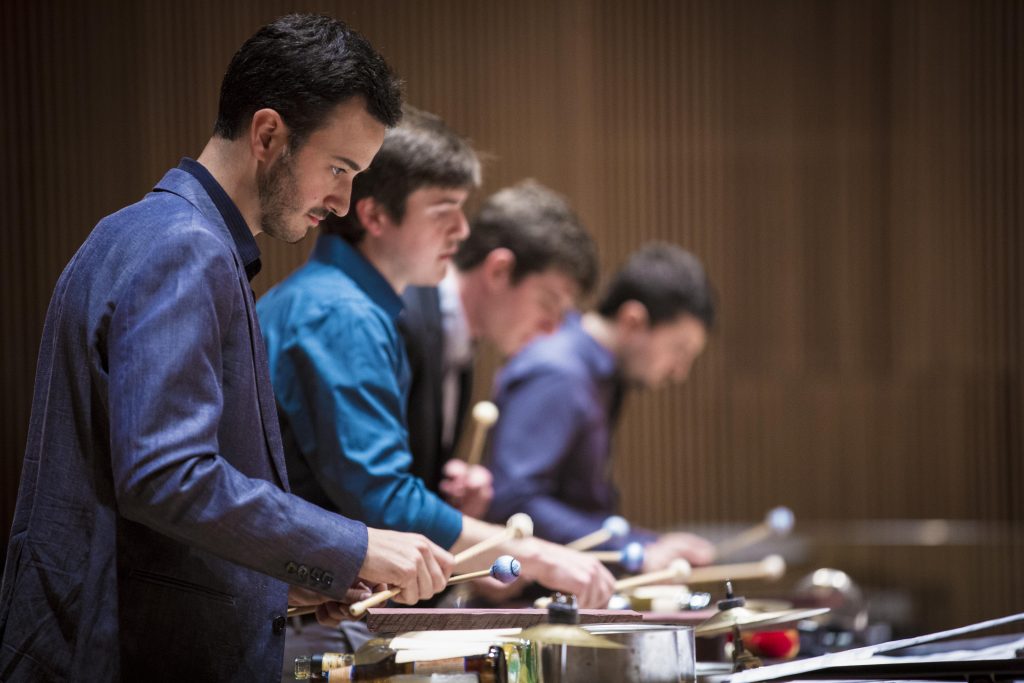Despite its lofty stature in the annals of rock history, Olympia hasn’t been recognized as an epicenter of new chamber music. That’s about to change, though, thanks to Emerald City Music and composer Andy Akiho. Akiho’s full-length percussion program, Seven Pillars, debuts this weekend at Seattle’s 415 Westlake and at The Washington Center for the Performing Arts in downtown Olympia.
Akiho is an internationally renowned composer, with commissioned premieres at the New York Philharmonic and the National Symphony. Seven Pillars will be performed by Sandbox Percussion, the Brooklyn-based drum quartet that commissioned it. It comprises seven movements plus four solos, one for each of Sandbox’s members. It was directed for the stage by filmmaker Michael McQuilken, who created futuristic lighting and produced multimedia visuals in support of its evocative music. “We wanted to create a visual collection,” says Akiho, “that can work individually or work as a whole. Each video can stand on its own as its own narrative, but all together are powerful. … I wanted to offer the performers and audience a collective experience within the percussion medium that could evoke the same expressive quality as a symphonic work, an opera or a rock show.”

Sandbox Percussion is Jonny Allen, Victor Caccese, Ian Rosenbaum and Terry Sweeney. Readers unfamiliar with modern chamber music may wonder how an all-percussion piece can remain interesting for an entire album’s worth of material, but only if they’re imagining a rock combo’s limited drum kit. What Sandbox Percussion creates is more like a cross between nature sounds and a Blue Man Group spectacle. “Performing Seven Pillars is kind of a marathon,” Rosenbaum explains. “It’s 85 minutes straight through without much of a break. This is both physically and mentally taxing, and we’ve been training ourselves up for it over the last couple of months.” The album version has been available since Sept. 24.
Rosenbaum says he “knew that Andy would stretch us, technically and musically, and he did not disappoint. Even though the instrumentation for the work is relatively compact for an evening-length percussion quartet, Andy created many new sounds and new ways to play all of these instruments.” For example, Akiho has the quartet playing the glockenspiel using timbale sticks, which gives the xylophone-like instrument a bell-like timbre. Chopsticks are used to play a tuned set of rice bowls. “It’s our hope,” Rosenbaum continues, “that these ideas will inspire another generation of composers to continue to invent on these instruments.”

Rosenbaum says he feels “honored that Andy accepted this commission. One of our primary goals was to help add something significant to the percussion repertoire for years and years to come. … The percussion world does not have too many evening-length pieces, and this is the longest chamber work that Andy Akiho has composed thus far in his career.”

So how should listeners approach this percussion chamber composition? Is it all just rat-a-tat, ting-a-ling, or does the piece have anything meaningful to say? “Seven is a very powerful number,” says Akiho. “In this case the title has to do with the architecture of the music. I pictured seven palindromic pillars that are holding the piece up, bound together by four solos that reflect the personalities of each performer.”
Rosenbaum agrees. “If Seven Pillars is about anything at all,” he says, “it is about structure. The 11 movements of the work are rigidly organized. They form a huge palindrome around Pillar IV, the central movement. Pillars I and VII, II & VI [and] III and V are pairs, [each] linked in all kinds of musical and aesthetic ways that you might discover as you listen.
“There’s a second process that you can follow, too,” Rosenbaum continues: “a sort of additive orchestration. Pillar I begins sparsely, with only unpitched instruments. Amethyst, the first solo movement, introduces the vibraphone, and with it pitch. The piece continues in this way. Each solo movement introduces another pitched instrument, and once that instrument appears in the solo, it is then featured in the rest of the movements.
“But all of this is extra credit,” Rosenbaum acknowledges. “If you’d prefer, you could ignore it all and just sit back and enjoy.”
Seven Pillars was developed via multiple extended residencies at New Hampshire’s Avaloch Farm Music Institute. The Washington Center for the Performing Arts requires all guests aged 12 or older to wear masks and show proof of vaccination, and adult visitors must present a photo ID.
Photo credits: Andy Akiho, Sandbox Percussion.
WHAT
Emerald City Music: Seven Pillars
WHEN
5 or 7:30 p.m. Saturday, Dec. 4
WHERE
The Washington Center for the Performing Arts Black Box Theater
512 Washington St. SE, Olympia
HOW MUCH
$14-$59
LEARN MORE
360-753-8586

